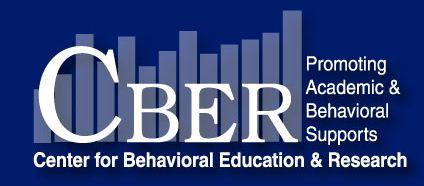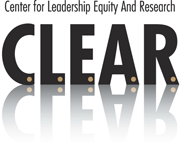Partners
 |
Association of Positive Behavior Supports (APBS)is an international organization dedicated to promoting research-based strategies that combine applied behavior analysis and biomedical science with person-centered values and systems change to increase quality of life and decrease problem behaviors. The Association is made up of a very diverse group of individuals.
|
 |
Center for Behavioral Education & Research
Formed in 2005 as part of the Neag School of Education, the CBER establishes an efficient and supportive work group where researchers can develop "leading edge" research that influences practice, policy, and educational science.
|
 |
The Center for Leadership, Equity, and Research (CLEAR) is dedicated to eliminating educational and social disparities, which impede equitable opportunities and outcomes for all students and the communities from which they arrive. This includes advocacy by its leadership, which is called upon to intentionally amplify a collective voice of educational leaders and allies through a forum of professional learning, political action, and community empowerment
|
 |
Educational and Community Supports (ECS) is a research unit within the College of Education at the University of Oregon that has operated since 1972.
ECS focuses on the development and implementation of practices that result in positive, durable and scientifically substantiated change in the lives of individuals with disabilities and their families. Federal and state funded projects support research, teaching, dissemination and technical assistance activities.
|
 |
The Illinois Positive Behavior Interventions & Supports component of the Illinois Statewide Technical Assistance Center (IS-TAC) an Illinois State Board of Education funded initiative promoting effective practices to benefit all children. |
 |
National Implementation Research Network (NIRN): The mission of the National Implementation Research Network (NIRN) is to close the gap between science and service by improving the science and practice of implementation in relation to evidence-based programs and practices.
|
 |
The Northwest PBIS Network, Inc. is a non-profit organization dedicated to supporting educators as they develop, implement and sustain safe and effective learning environments where all students experience success.
WPBISN provides quality Professional Development and Technical Assistance for schools implementing Positive Behavioral Interventions and Supports.
|
 |
PBIS Assessment is a web-based application designed to assist in high-fidelity, sustained implementation of school-wide positive behavioral interventions and supports (SW-PBIS). |
 |
The School-Wide Information System (SWIS) is a web-based information system designed to help school personnel to use office referral data to design school-wide and individual student interventions. The three primary elements of SWIS are:
An efficient system for gathering information
A web-based computer application for data entry and report generation
A practical process for using information for decision making
These three elements give school personnel the capability to evaluate individual student behavior, the behavior of groups of students, behaviors occurring in specific settings, and behaviors occurring during specific time periods of the school day. SWIS reports indicate times and/or locations prone to elicit problem behaviors, and allow teachers and administrators to shape school-wide environments to maximize students' academic and social achievements.
|
 |
The TA Center on Positive Behavioral Interventions and Supports has been established by the Office of Special Education Programs, US Department of Education to give schools capacity-building information and technical assistance for identifying, adapting, and sustaining effective school-wide disciplinary practices.
|
 |
The University of Connecticut's Neag School of Education is not only the #1 public graduate school of education in the Northeast and the East Coast, it is ranked the 16th best public graduate school of education in the U.S.
In its annual review of the best graduate schools in the country, U.S. News and World Report ranks the Neag School #24 among the 278 private and public education schools surveyed. Also significant are the rankings of the Neag School's core programs which are individually assessed by U.S. News. Three rank among the nation's top 25, including: Elementary Education (14), Curriculum & Instruction (22), and Special Education (17). We are also the home of the nation's #1 doctoral program in kinesiology ranked by the American Academy of Kinesiology and Physical Education.
Our reputation for quality was a key factor in the Carnegie Corporation of New York's decision to select the University of Connecticut as one of 11 members of its prestigious Teachers for a New Era network.
Although we are most often noted for our teacher preparation efforts, the Neag School is home to a broad range of programs of study and research offered by our four departments: Curriculum & Instruction, Educational Psychology, Educational Leadership, and the newly merged departments of Kinesiology and Physical Therapy. Although distinct in nature, these departments work collaboratively to prepare high quality clinicians, educators, and practitioners who are leaders in their fields from athletic training and exercise science to physical therapy and school counseling.
|
 |
The University of Oregon College of Education is a network of inclusive learning communities. Undergraduate, graduate students, and continuing professionals study with nationally recognized faculty to become:
• Teachers
• Administrators
• Clinicians
• Social service professionals
• Educational research scientists
Our research faculty and graduate students also work together with school districts and agency partners to meet the needs of children and families nationwide. These partnerships give our students access to the diverse array of the best practices in education and human services, from a range of academic programs, from the research of nationally renowned faculty, and from our practicing professional partners in the field.
In addition to our academic programs, the UO College of Education includes an alliance of nationally prominent centers, institutes, and affiliated research and outreach units working to fulfill our mission: Making Educational and Social Systems Work for All.
|
 |
The Life Skill Education Institute in the Graduate School of Hosei University, Tokyo, Japan was established to find ways to solve social problems and facilitate the development and implementation of life skills education. The Institute aims to develop evidence-based life skills education to promote health in families, schools, companies, and communities by applying knowledge gained from basic research in cognitive psychology, developmental psychology, behavioral analysis and clinical psychology.
|
-
|